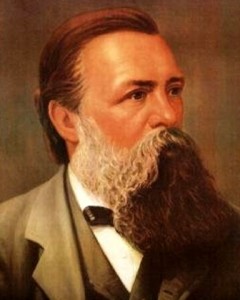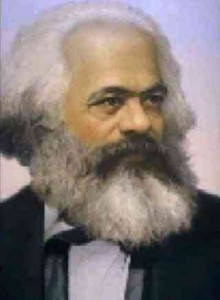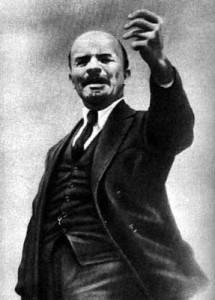 By A. Shaw
By A. Shaw
Today, in 2015, there must be at least 5000 brands of anarchism. Some of these brands attack the proletariat from the Left and others from Right. Leftwing anarchism was the first ideological current that substituted intrigue, splitting of sects, and rampant sectarianism for political struggle.
Leftwing anarchism abstains from political struggle, but wallows in sectarianism.
Now, 120 years after Engels’ death, Bakunin’s brand of anarchism, with certain minor modifications, still exemplifies leftwing anarchism.
THE MAIN EVIL
“As for Bakunin, the state is the main evil, nothing must be done which can maintain the existence of any state, whether it be a republic, a monarchy or whatever it may be,” Engels writes in a Jan.1872 letter to Theodor Cuno.
To anarchism, the form of the state — that is, “a republic, a monarchy or whatever it may be” — does not alter the evil character of the state. Moreover, to anarchism, the content of the state — that is, whether it be a slaveholding state, a feudalist state, bourgeois state, or proletarian state — does not alter the evil character of the state.
The state is evil, the anarchist insists. Case closed.
The regime in the USA has a democratic form, and bourgeois content. The regime in Saudi Arabia has monarchical form and bourgeois content. The government of North Korea has monarchical form and proletarian content. The government of Cuba has democratic form [based on multi-candidate elections — not multi-party elections – at the municipal level] and a proletarian content.
Form reveals HOW state power is exercised and is often laid out in the constitution of the state.
Content tells us WHO or what social class chiefly exercises state power and for whom is power chiefly exercised.
The anarchist condemns the state as the “main evil” whatever its form and content, so nothing must be done to maintain or defend the existence of any state.
Anarchism and Marxism agree that the state is the organized power of one class for oppressing or holding down another, as Marx and Engels argue in the Communist Manifesto.
In others words, the principle function of a state, regardless of form, is oppression. Again, this is common ground between Marxism and anarchism.
In ancient Greece, the so-called master class oppressed the class of slaves, using the slaveholding state as an instrument of oppression whether the regime’s form was democratic or undemocratic. During the feudalist era, the landowners oppressed peasants, using the feudalist state. In bourgeois society, the capitalist class oppresses or holds down the working class, using the bourgeois state, no matter how democratic is the form of the state. In a socialist society, the working class uses the proletarian state, which may be either democratic or undemocratic to hold down the bourgeoisie ousted from power by revolution.
Of course, communism, which follows socialism by hundreds of years, gradually makes the state superfluous. Classes based on relations to the means of production and income disparities begin to die out. The state, which oppresses classes, withers away as these classes fade away.
COMPLETE ABSTENTION
Engels writes “Hence therefore complete abstention from all politics. To perpetrate a political action, and especially to take part in an election, would be a betrayal of principle …Â To preach that the workers should in all circumstances abstain from politics is to drive them into the arms of the priests or the bourgeois republicans.”
The principle, above, to which Engels refers is the anarchist principle of political abstention. This is the benchmark principle of anarchism.
In the mid-term U.S. elections of 2014, the abstention of the working and middle classes reached astounding proportions and bourgeois reactionaries grew more powerful in the bourgeois state which oppresses other classes.
Engels calls the Left anarchist a swindler when the Left anarchist urges workers to drop out of the political struggle.
Engels says something like you can fool workers sometimes but not all of the time, here “But the mass of the workers will never allow themselves to be persuaded that the public affairs of their country are not also their own affairs; they are by nature political and whoever tries to make out to them that they should leave politics alone will in the end get left in the lurch.”
If anarchist identity is determined by political inactivity rather than anarchist consciousness and theory, then anarchism may be the largest tendency within the U.S. working class.
THE MECHANICS OF THE ANARCHIST SWINDLE
Let’s assume a race between candidate A and candidate B for some office.
Let’s further assume you support candidate A.
There are two ways you can help candidate A:
(1) give support directly to candidate A or
(2) block support going to candidate B
No. (1) — that is, give support directly to candidate AÂ — is the politics of participation
No. (2) — that is, block support going to candidate BÂ –Â is the politics of abstention
Let’s assume you argue that you are evenhanded between candidate A and B because you urge voters and operatives not to support either candidate.
Say a constituency votes 90% for a candidate like B [e.g., like in some African American districts] and 10% for a candidate like A.
If the leftwing anarchist persuades voters and volunteers to abstain, candidate B will suffer a blow nine times harder than his opponent.
That is not evenhanded. That is two-faced.
HEAP ABUSE UPONÂ THE STATE
What does the anarchist do while he abstains from politics?
“The thing to do is to conduct propaganda, heap abuse upon the state, organize until all workers are won over …,” Engels says about the anarchist.
In other words, the anarchist talks as he waits.
When it comes to conducting propaganda against the state, many anarchists are phenomenal. Many of them have a knack.
When either the ruling bourgeoisie [e.g., USA] or the ruling proletariat [e.g., Cuba] exercises state power in the wrong way, anarchists have a knack of finding out what happened and making propaganda about the transgression.
A presupposition of anarchist propaganda is: If there were no state, then state power could not be exercised in the wrong way.
AUTHORITY
According to Engels, anarchist society will not tolerate authority.
“In this society there will above all be no authority, for authority = state = an absolute evil. (How these people propose to run a factory, work a railway or steer a ship without having in the last resort one deciding will, without a unified direction, they do not indeed tell us.) The authority of the majority over the minority also ceases. Every individual and every community is autonomous, but as to how a society, even of only two people, is possible unless each gives up some of his autonomy, Bakunin again remains silent,” Engels writes.
Apparently, anarchists believe the state is the main evil or the absolute evil because the state has more authority than other institutions.
So, “every individual and every community is autonomous.” This proposition has generated thousands of intrigues, splits, and savage sectarianism within the anarchist movement.
“Every individual … is autonomous.” is a favorite proposition of rightwing anarchism.
“Even if this authority is voluntarily bestowed it must cease simply because it is authority,” Engels observes
CONCLUSIONS
Anarchists want to abolish the state today. Marxists are willing to wait hundreds of years for the state to wither away.
Both anarchists and Marxists believe the state, even in a democratic form, is an instrument by which one class oppresses another.
Anarchists want to abstain from the struggle for power. Marxists struggle for power.
Anarchists say nasty things about the ruling class whether it is bourgeois or proletariat. Marxists truthfully defend the proletarian state.
Anarchists are intolerant of authority. Marxists greatly uses authority, especially during socialism, the stage of development between capitalism and communism.
“Here you have in brief the main points of the swindle,” Engel writes.
By swindle, Engels means anarchism.
















